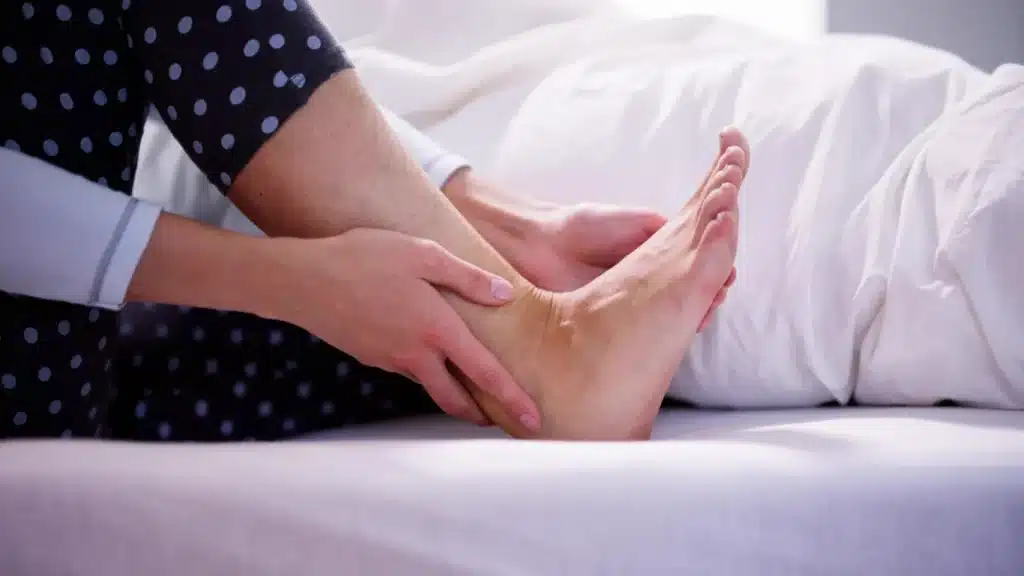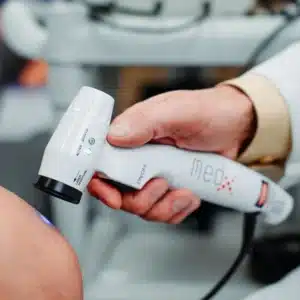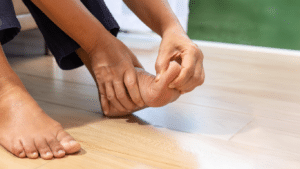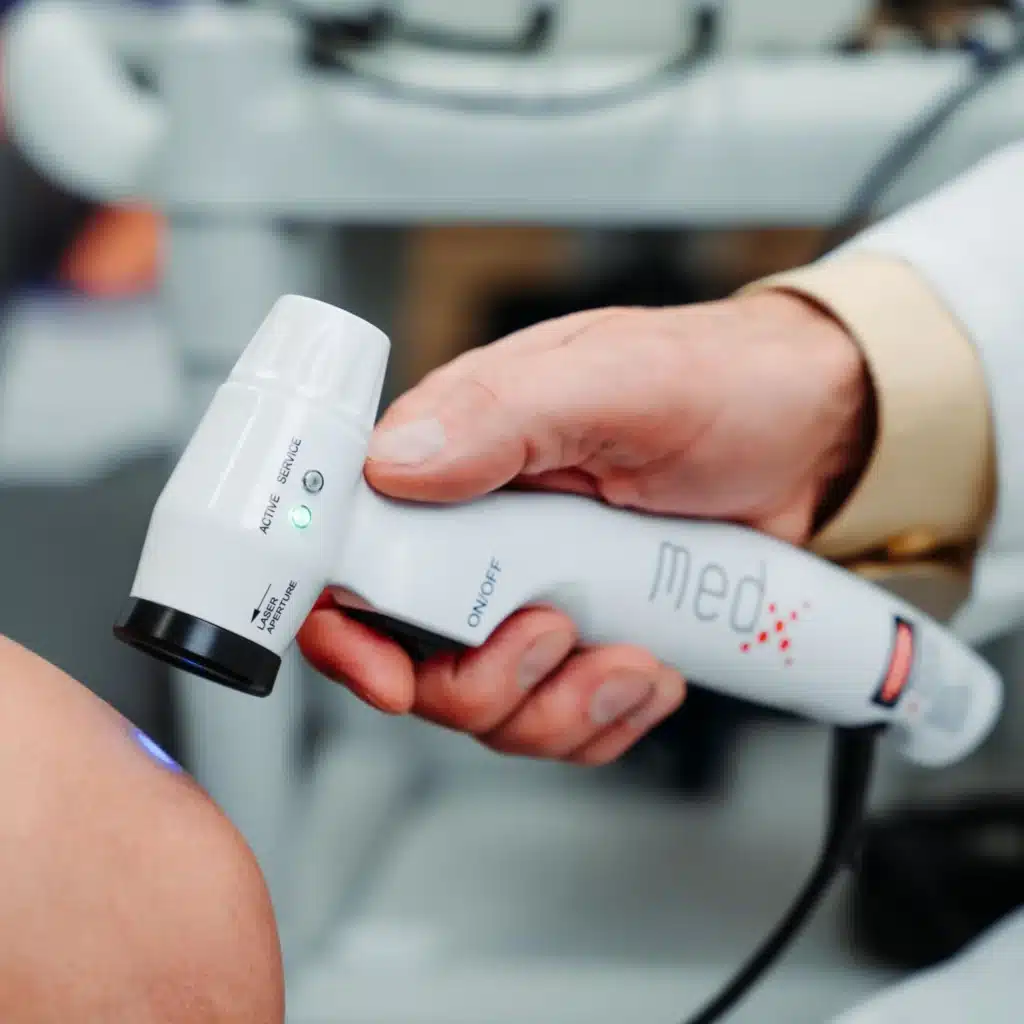Waking up and taking that first step out of bed only to feel a sharp, stabbing pain in your heel can be frustrating and concerning. Many people experience this type of discomfort, often assuming it’s just a minor annoyance that will go away on its own. But when heel pain persists, especially in the mornings, it could signal an underlying condition that deserves attention.
At LMC Footcare, we frequently see patients with morning heel pain. Early-stage plantar fasciitis is a common culprit, and addressing it promptly can prevent long-term discomfort and mobility issues. In this blog, we’ll explore why heel pain often strikes first thing in the morning, what it might indicate, and how custom insoles can provide the support your feet need to stay pain-free.
What Causes Morning Heel Pain?
Morning heel pain is most commonly associated with plantar fasciitis, an inflammation of the plantar fascia, a thick band of tissue that runs along the bottom of your foot connecting the heel to the toes. This tissue supports your foot’s arch and absorbs shock when you walk or run.
Here’s why the pain is often worse in the morning:
- Muscle Tightness Overnight: While you sleep, your plantar fascia and calf muscles tighten. When you take your first steps in the morning, the sudden stretch can trigger sharp pain.
- Inflammation Build-Up: Small micro-tears in the plantar fascia from daily wear-and-tear can cause inflammation. Overnight, fluids accumulate around the tissue, increasing pressure and sensitivity in the morning.
- Foot Mechanics: Improper foot alignment, flat feet, high arches, or overpronation can place extra strain on the plantar fascia, contributing to pain, especially after periods of rest.
Other Factors Contributing to Heel Pain
While plantar fasciitis is the most common cause, there are additional factors that can contribute to persistent heel pain:
- Excess Weight: Extra body weight increases the strain on your feet and plantar fascia.
- Improper Footwear: Shoes that lack arch support, are too big or too small fitting, or are not appropriate for your specific walking mechanics can exacerbate strain on your feet.
- Activity Level: Sudden increases in activity, long periods of standing, or high-impact sports can stress the plantar fascia.
- Age: Plantar fascia loses elasticity over time, making it more susceptible to inflammation.
- Pregnancy: Increased weight gain coupled with ligament laxity.
Why the Pain Doesn’t Go Away
Morning heel pain that persists is often a sign that the underlying issue hasn’t been addressed. Simply stretching or icing may provide temporary relief, but without proper support, the plantar fascia continues to bear excess strain. Over time, this can worsen the condition, leading to chronic pain and even changes in walking patterns that affect your knees, hips, and lower back.
Early intervention is key. The sooner you address the problem, the better the chances of preventing long-term complications and returning to pain-free activity.
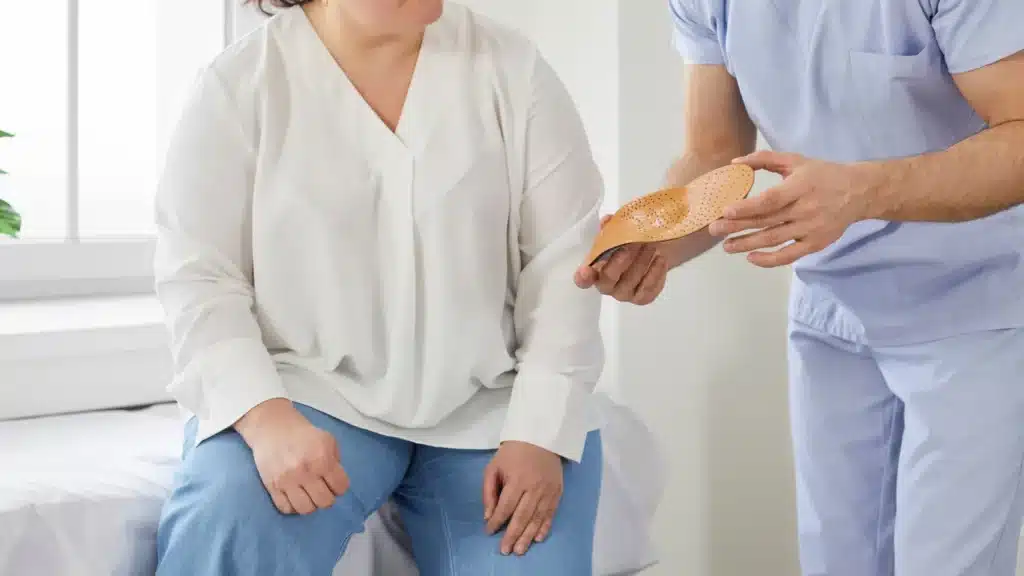
How Custom Insoles Can Help Heel Pain?
One of the most effective ways to manage plantar fasciitis and reduce morning heel pain is with custom orthotics or insoles. Unlike over-the-counter inserts, custom insoles are designed specifically for your foot’s structure and mechanics. Here’s how they help:
- Arch Support: Custom insoles provide targeted support to your arches, relieving tension on the plantar fascia.
- Shock Absorption: They reduce impact forces when walking or running, which helps prevent further micro-tears and inflammation.
- Improved Foot Alignment: Properly aligned feet reduce uneven strain on the heel, arches, and surrounding muscles, improving comfort and reducing pain.
- Pain Relief and Recovery: By redistributing pressure across your feet, custom insoles can provide immediate relief and support long-term healing.
At LMC Footcare, our footcare specialists (chiropodists) use advanced assessments to create insoles tailored to your unique foot shape and gait, ensuring optimal comfort and effectiveness.
Additional Tips for Managing Heel Pain
While custom insoles are highly effective, combining them with daily habits can speed recovery and prevent further issues:
- Stretch Regularly: Gentle stretches for the plantar fascia and calves can reduce morning stiffness.
- Wear Supportive Footwear: Avoid walking barefoot on hard surfaces. Shoes with good cushioning and arch support are essential.
- Gradually Increase Activity: Avoid sudden increases in running, jumping, or standing for long periods.
- Maintain a Healthy Weight: Reducing excess strain on your feet can help minimize heel pain.
FAQs About Morning Heel Pain and Plantar Fasciitis
1. Is morning heel pain always plantar fasciitis?
Not always, but plantar fasciitis is the most common cause. Other possibilities include Achilles tendonitis or nerve irritation. Heel spurs don’t cause pain but are a result of strain on the plantar fascia. Spurs are a protective mechanism to prevent the fascia from separating. It’s a sign that the plantar fascia is under strain. A professional foot assessment can determine the exact cause.
2. Can stretching alone fix morning heel pain?
Stretching can help reduce stiffness, but without proper arch support or correction of foot mechanics, pain is likely to persist. Custom insoles are often needed for long-term relief.
3. How long does it take for custom insoles to reduce pain?
Many patients notice improvements within a few days to weeks of wearing their custom insoles. Consistency and proper footwear usage enhance results.
4. Are over-the-counter insoles effective for plantar fasciitis?
Over the counter insoles are not supportive but provide cushioning. While it may initially feel good to the touch, it’s actually the opposite of what’s needed- arch support. IT may lead to increased symptoms over time.
5. Can plantar fasciitis go away on its own?
It’s possible, but without addressing the underlying foot mechanics and strain, it may take months or even rest and can recur. Early intervention with proper support can prevent chronic pain.
Conclusion
Persistent morning heel pain is not something to ignore. Early-stage plantar fasciitis and foot misalignment are often the cause, and without proper intervention, it can worsen over time. Custom insoles provide targeted arch support, improve foot alignment, and reduce the strain that causes pain.
At LMC Footcare, we help patients in Vaughan, Bayview/Midtown Toronto, and beyond address heel pain with personalized solutions. If you’re tired of waking up to sharp heel pain, it’s time to take action. Book an appointment today to assess your feet and explore custom insoles that can help you start your day pain-free.



